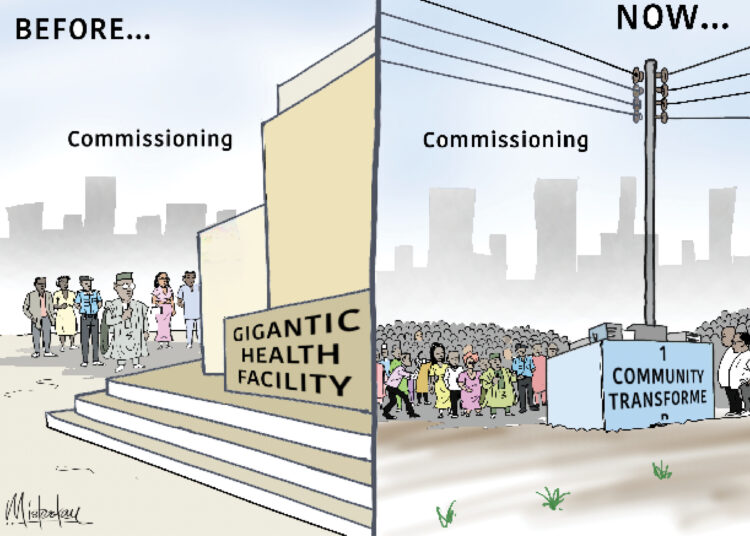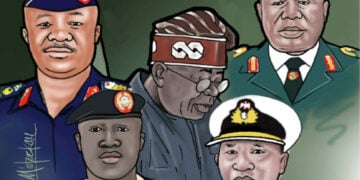“And now, ladies and gentlemen, please rise and give a standing ovation to welcome the re-inventor of our state, our far-sighted, God-ordained leader, the father of our civilisational aspirations, the father of infrastructural wonders, the most outstanding governor in the whole of Nigeria, His Excellency, the Executive Governor of Nwamkpi State, Architect Doctor Sir Chikeson Tesibiayetesi Ibrahim, OFR, CFR, Knight of the Order of River Tiber….”
A choreographed session of applause follows while the governor “humbly” makes his way to the podium, bowing severally in a rehearsed show of meekness and at the same time acknowledging cheers from his hired thugs who have formed an invisible protective ring around the perimeter of the venue…
By the time the governor makes it to the microphone, the audience has been whipped up to a frenzy with the live band singing provocative political tunes, the type that can make political opponents jump off a cliff or, to quote their favourite refrain, “Hug a transformer!”
Ego Trip
The governor clears his throat and informs the gathering that he was going to be very brief because other state matters needed his attention. He speaks for 45 minutes. Half of the time, he is engaged in self-adulation although he gives the glory to God because, “He saw it fit to persuade me to leave a very lucrative private practice to come down here and serve my people as their executive governor…” Hear, hear… Applause.
He then invites the commissioner for works to come and explain the significance of the project he was about to commission. The commissioner is accompanied by the bespectacled contractor, a rotund hulk whose role is to agree with everything the commissioner says with an agama-lizard-type series of nods.
Time up for the climax: a young student presents a ribboned pair of scissors on a tray to His Excellency and he invites the traditional rulers, commissioners, honourable members of parliament and other dignitaries to join him in the Photo-Op: the commissioning of the 750-metre link road between Main Avenue and Broad Street.
“You mean all these people were invited just to witness the commissioning of a 750-metre road?” A bystander asked his neighbour.
“Yes, and what’s wrong with that?” replies the neighbour.
“It looks cheap to me. Shouldn’t the governor be busy with more important things?”
“What could be more important than dramatising the provision of the dividends of democracy?”
“I wish the governor was commissioning an expressway. But 750 metres ought to be beneath the dignity of a governor in a proper democracy.”
“That’s your problem. Some governors in some other places have been known to commission culverts for channelling waste water.”
“Chai! Standards have fallen! I can’t recall one instance of this kind of charade in the First Republic. Only landmark projects attracted such publicity, like the commissioning of WNTV/WNBS, the first TV station in Africa; or the first skyscraper in Western Region, the Cocoa House; or the Ibadan-Ijebu-Ode Highway etc”
Fallen Standards
As a chronicler, I am worried. I don’t know if it bothers you too, but I’m perturbed that we seem to be producing substandard humans in public office compared to their counterparts decades ago. Standards have fallen so badly, especially in relation to the quality, quantity and relevance of projects. Public expectation has also nosedived. People don’t seem to expect much from their political leaders anymore.
Perhaps we could trace the fall in standards of our political leaders to a fall in the quality of their education. Indeed, a researcher, Chinelo Ogoamaka Duze, had reached this conclusion earlier in her study, “Falling Standards of Education in Nigeria: An Empirical Evidence in Delta State of Nigeria”, and I’m only parroting her findings here:
“We believe that the falling standard in education in Nigeria could be linked also to the lost glories of traditional education which inculcates among other things the very important values of hard-work, diligence, integrity, and high productivity. When these are lacking in any production system, education inclusive, the results are often devastating leading especially to poor quality output and wastage which in themselves undermine capacity building and sustainable development. The tertiary level produces the much desired human capital that propels nations from backwardness to modernisation. But it has to be fed from the lower levels.
A “mal-nourished” primary level would breed a “kwashiokored” secondary level that culminates into a “masrasmused” tertiary level. A survey of the opinions of 5,507 stakeholders was therefore carried out to determine whether educational standards were actually falling in Nigeria and at what level it was most grievous. It was found that standards have fallen at all levels of education, with the tertiary level being most hit, followed by secondary, and least, primary level. Three major reasons found were poor funding of education, poor implementation of educational policies and programmes and poor attitude to school-work.
Televised Idiocy
I don’t want to make this discussion academic. In plain language, what I am saying is that we are producing a horde of unserious political leaders at various levels of government. They are unprepared for the leadership roles we thrust upon them. Their standards are low. Their horizon is short. They are never visionary but always transactional. You task them too much if you suggest that they should plan for future generations. For them, tomorrow ought to take care of itself.
It is vexatious that even when you try to avoid the provocation of watching a 419 commissioning on live television and you tune to another station, it is as if the politrician is ubiquitous because he’s waiting for you at the next station. You are condemned to watching him and listening to his savage lingo and demonstration of megalomania as he has bought prime time on four major national TV stations. Perhaps the National Broadcasting Commission or the Federal Competition & Consumer Protection Commission ought to protect the helpless viewer from this broadcast terrorism of forced viewership.
It is bad enough that the system allows a political appointee to waste public funds advertising himself and commissioning a project broken into several stages in such a way that the various stages are commissioned separately and beamed live on prime time TV because all the major television stations had been “bought” by the minister or governor or CEO.
Looking back at the great men and women of the First Republic, it is inconceivable that many of those who call the shots today would have qualified to carry the office files of those gentlemen of yore. Where are the equivalents of the great Awo or Zik, Sardauna, Balewa, Okpara, Osadebey, Adelabu, Tarka,
Funmilayo Ransome-Kuit, Margaret Ekpo, Gambo Sawaba et al.
Compare how we have been carrying on in the last 10 years to India’s giant strides within the same period. In the past decade, Indian Railways has laid 31,000+ km of tracks, facilitating better connectivity and travel across the nation. The construction of 11,900 Road Over Bridges (ROB) and Road Under Bridges (RUB) has improved infrastructure and safety for passengers. Over 12,600 million tonnes (MT) of freight loading was achieved, while 44,000 route kilometres (rkm) were electrified, contributing to a greener and more sustainable railway network.
Yet, it is our peculiar brand of televised idiocy, our cash-and-carry “democracy” that we hope to pass on to the next generation? I can’t help asking why.





